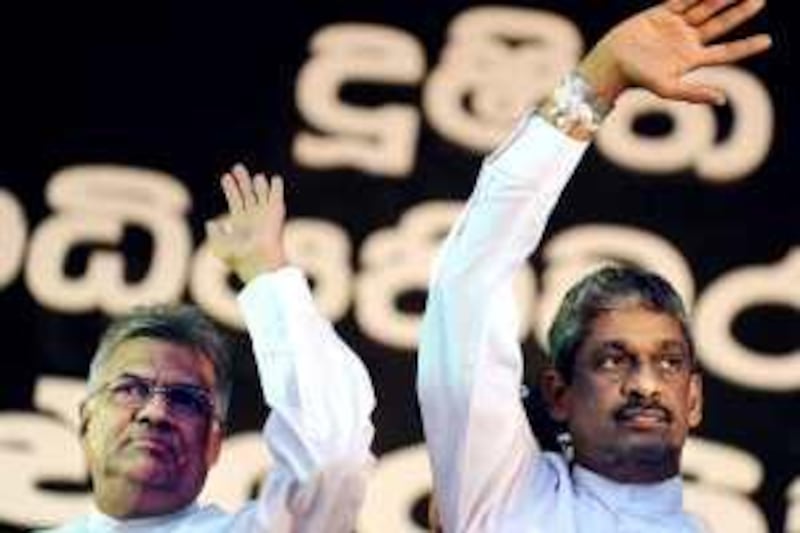COLOMBO // With the result of next month's parliamentary election almost a certainty, the focus has shifted to the floods of candidates overwhelming voters at the ballot box. President Mahinda Rajapaksa's ruling party is expected to romp to victory in the poll, which will see a total of 7,520 contestants vying for just 225 seats - the highest number in the country's history.
In the eastern district of Digamadulla, voters will be faced with a ballot paper more than a metre long as 660 candidates will contest just seven parliamentary seats. Across the country the poll, on April 8, will see an average of 33 candidates contesting each seat. The candidates come from 36 political parties and 336 independent groups, up from 6,049 candidates from 24 parties and 192 independent groups at the previous poll in 2004.
While the rates of participation would be welcomed in many countries as a victory for the democratic process, in Sri Lanka they are being seen by many as underhand tactics by the main parties. The numbers led the veteran editor of the Ravaya newspaper, Victor Ivan, to describe the elections as a "big joke". Only a handful of contestants are sincere about serving the people while the majority of candidates are fulfilling their own or someone else's agenda, according to Rohana Hettiarachchi, the executive director of People's Action for Fair and Free Elections, an election monitor.
"The large number of independent [non party] groups is for many reasons - these candidates don't get their own party nomination so they contest as independents, they are a back-up group for a political party, and closer to the election withdraw from the poll and offer their support to another candidate," he said. A senior newspaper editor from the Tamil-dominated northern region of Jaffna, where 327 candidates are contesting nine seats, said the large number of independent groups is a government tactic to confuse voters. "I thought it was only happening in Jaffna but then found it was all over the country," he said.
While Mr Rajapaksa's candidates are contesting under the ruling party banner, United People's Freedom Alliance (UPFA), the opposition has broken into several groups and alliances with the main opposition leader, Ranil Wickremesinghe, leading one alliance, while Sarath Fonseka, who was defeated in the recent presidential race, is heading another alliance. Mr Fonseka lost the poll on January 26 to Mr Rajapaksa amid allegations of election fraud against the governing party, and a few days later was arrested on charges of attempting to overthrow the government and foreign exchange fraud among other issues. The former army general is under military detention and his wife, Anoma, is campaigning on his behalf.
So far, reports of election violence have been between candidates from the same party. "Of the 14 complaints we have received so far, nine are from clashes between candidates from the same party," Mr Hettiarachchi said. Since the 1980s, Sri Lankan elections have used the system of proportional representation in which voters must vote for the party and then candidates of their choice. This is unlike the earlier first-past-the post system inherited from the island's British colonial rulers. Thus candidates within parties have to outdo their own party members to secure votes.
Of the 225 members of parliament, 196 are elected from 22 multi-member electoral districts while the remaining 29 are from a national list allocated to the contending parties and independent groups in proportion to their share of the national vote. Most political analysts say the election will be a conclusive victory for the president whose armed forces, led by Mr Fonseka before their falling out, crushed Tamil rebels last May.
"There is no doubt that the president's party will win but how many seats will the get? I believe the UPFA would win 125 seats but not a two-thirds majority of parliament," Mr Ivan said. The ruling party has expressed confidence in getting a two-thirds majority. Despite the predictable outcome, this year has seen an increase in eligible voters, with 14 million registered to vote, up from 12.8 million in 2004.
@Email:foreign.desk@thenational.ae





